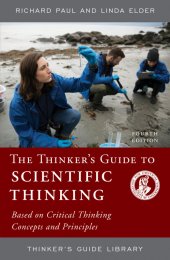Additional Information About:
The Thinker's Guide to Scientific Thinking - Based on Critical Thinking Concepts and Principles
A critical approach to learning science is concerned less with accumulating undigested facts and scientific definitions and procedures, than with learning to think scientifically. As we learn to think scientifically, we inevitably organize and internalize facts, learn terminology, and use scientific procedures. But we learn them deeply, because they are tied into ideas we have thought through, and hence do not have to “re-learn” later. A critical approach to learning science requires us to ponder questions, propose solutions, and think through possible experiments.
A well cultivated scientific thinker:
• raises vital scientific questions and problems, formulating them clearly and precisely;
• gathers and assesses relevant scientific data and information, using abstract ideas to interpret them effectively;
• comes to well-reasoned scientific conclusions and solutions, testing them against relevant criteria and standards;
• thinks openmindedly within convergent systems of scientific thought, recognizing and assessing scientific assumptions, implications, and practical consequences; and
• communicates effectively with others in proposing solutions to complex scientific problems.
Scientific thinking is, in short, self-directed, self-disciplined, self-monitored, and self-corrective. It presupposes assent to rigorous standards of excellence and mindful command of their use. It entails effective communication and problem solving abilities as well as a commitment to developing scientific skills, abilities, and dispositions.
This guide is designed for students and faculty. It consists of the essence of scientific thinking concepts and tools. For faculty it provides a shared concept of scientific thinking. For students it is a scientific thinking supplement to any textbook for any science course. Faculty can use it to design science instruction, assignments, and tests. Students can use it to improve their perspective in any domain of science.
Contents include:
- Why Scientific Thinking
- The Elements of Scientific Thought
- A Checklist for Scientific Reasoning
- Questions Using the Elements of Scientific Thought
- Scientific Thinking Seeks to Quantify, Explain, and Predict Relationships in Nature
- Scientific Thinking Requires Precision
- Experimental Thinking Requires Experimental Controls
- Universal Intellectual Standards in Scientific Thinking
- Analyzing the Logic of Scientific Articles
- Analyzing the Logic of Science Textbooks
- Two Kinds of Scientific Questions
- Analyzing the Logic of An Experiment
- Criteria for Evaluating Scientific Reasoning
- Scientific Reasoning Abilities
- Intellectual Dispositions Essential to Scientific Thinking
- What Scientific Thinkers Routinely Do
- Stages of Scientific Thinking Development
- The Questioning Mind in Science (Newton, Darwin, and Einstein)
- The Logic of Science
- Logic of Scientific Disciplines
- The Logic of Physics
- The Logic of Chemistry
- The Logic of Geology
- The Logic of Astronomy
- The Logic of Biology
- The Logic of Zoology
- The Logic of Botany
- The Logic of Biochemistry
- The Logic of Paleontology
- The Logic of Animal Physiology
- The Logic of Archaeology
- The Logic of Ecology
- The Problem of Unscientific Thinking
- A Pseudo-Science: Why Astrology is Not a Science
